Collateral Beauty Blu-ray Movie
HomeCollateral Beauty Blu-ray Movie 
Blu-ray + UV Digital CopyWarner Bros. | 2016 | 97 min | Rated PG-13 | Mar 14, 2017
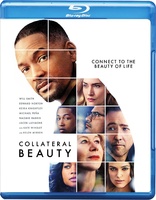
Movie rating
5.8 | / 10 |
Blu-ray rating
| Users | 4.0 | |
| Reviewer | 1.5 | |
| Overall | 2.6 |
Overview
Collateral Beauty (2016)
A tragic event sends a New York ad man on a downward spiral, prompting his partners to adopt a desperate strategy to save their business.
Starring: Will Smith, Edward Norton, Kate Winslet, Michael Peña, Helen MirrenDirector: David Frankel
| Drama | 100% |
Specifications
Video
Video codec: MPEG-4 AVC
Video resolution: 1080p
Aspect ratio: 2.40:1
Original aspect ratio: 2.39:1
Audio
English: DTS-HD Master Audio 5.1 (48kHz, 24-bit)
French (Canada): Dolby Digital 5.1
Spanish: Dolby Digital 5.1 (640 kbps)
Portuguese: Dolby Digital 5.1
English: Dolby Digital 5.1 (640 kbps)
English DD=narrative descriptive
Subtitles
English SDH, French, Portuguese, Spanish
Discs
Blu-ray Disc
Single disc (1 BD)
UV digital copy
Playback
Region A (B, C untested)
Review
Rating summary
| Movie | 1.0 | |
| Video | 5.0 | |
| Audio | 4.0 | |
| Extras | 1.0 | |
| Overall | 1.5 |
Collateral Beauty Blu-ray Movie Review
Circuitous Nonsense
Reviewed by Michael Reuben March 19, 2017Should one read anything into the failure of Warner Brothers Home Entertainment to send out
screeners of Collateral Beauty before street date? Is their delay the Blu-ray equivalent of
canceling critics' screenings before a theatrical release in the hope of hoodwinking tickets buyers
on opening weekend? It's not as if the word on Collateral Beauty wasn't already out. The film
arrives on Blu-ray bathed in flop sweat, with a 12% rating at Rotten Tomatoes and a
domestic box office take less than its production budget. It's one of the certified turkeys of 2016.
Much as I'd like to be able to report that director David Frankel's (The Devil Wears Prada)
attempt at a sentimental Christmas fable deserves a second chance, I cannot do so. The film is a
textbook example of good intentions gone wrong and yet another demonstration that even the best
actors can't salvage flawed material.

Spoiler warning: No attempt has been made below to conceal Collateral Beauty's "twists" and "reveals". Read further, and you will encounter spoilers.
In the Blu-ray extras, everyone calls Collateral Beauty a "fable", and screenwriter Allan Loeb (Things We Lost in the Fire) specifically invokes It's a Wonderful Life, a reference that underlines where Loeb's script goes wrong at the outset. Frank Capra's Yuletide classic spends about 90 minutes creating the world of Bedford Falls and its inhabitants and establishing George Bailey's character and history. When George comes apart on Christmas Eve, the stakes are genuine because the audience has come to know him almost as well as his neighbors do. Loeb's script dispenses with the hard work of establishing its protagonist, introducing ad man Howard Inlet (Will Smith) in a single opening scene, where he delivers an inspirational speech to his partners and staff. It's a slick presentation, as glibly charming as a Don Draper campaign, but that's the sum total of our acquaintance with Howard.
Cut to three years later, when Howard has been laid low by the death of his six-year-old daughter—a horrible event, to be sure, but one with no emotional resonance, because Loeb and Frankel haven't taken the trouble to bring Howard or his daughter to life onscreen. Howard's grief is supposed to be expressed by the elaborate domino configurations he constructs and knocks down, but they're no more than an abstraction until you learn (which you don't until the end) that he used to build them with his daughter. Imagine if Capra had left out all the scenes of George Bailey's home life, forcing Jimmy Stewart to show how much George misses Mary and the kids by scowling and looking glum.
Howard's three partners are drawn in somewhat greater detail, with each of them—Whit (Edward Norton), Simon (Michael Peña) and Claire (Kate Winslet)—burdened by a neatly framed personal problem (divorce, disease and ticking biological clock). Their most immediate dilemma, however, is the ad agency's decline since its chief creative talent has been drowning in sorrow. Their solution is to "gaslight" their long-time friend and colleague into believing that he's being visited by three spirits representing Love, Death and Time, which Howard has defined in his opening speech as the three key elements of our common humanity and to whom he has been writing outraged letters. (One character even calls the scheme "gaslighting", which becomes a joke when no one gets the reference.) The ultimate goal is to have Howard declared incompetent, so that he loses control over his shares in the company. Collateral Beauty devotes more screen time to the awkward machinations of this dubious masquerade than it does to establishing Howard's character.
The actors hired to impersonate the three abstractions are the best thing in Collateral Beauty, as Keira Knightley, Jacob Latimore (Ride Along) and a standout Helen Mirren play an assortment of struggling New York thespians, with Knightley all tears and emotion, Latimore all sass and attitude, and Mirren treating the job like it's the role of a lifetime (she even offers to play all three parts herself). While the actors are stalking Howard, with a private detective surreptitiously filming the encounters, the bereaved dad haunts a grief therapy group run by Madeline, who is played by Naomie Harris in a role that virtually screams, "I'm more than I appear!" When Madeline's true identity is revealed on Christmas Eve, it retroactively saps all her scenes with Howard of any credibility. (Seriously. Go back and rewatch them.)
(Final warning: The biggest spoilers lie below.)
The conspiracy works, of course, but not before each of the three actors has bonded with one of the conspirators who hired them, with life-altering results. As Howard returns to his old self, the ad agency is saved and the three schemers are richly rewarded for betraying their friend. In the final sequence of Collateral Beauty, spring is in the air, and Howard is walking through Central Park with a smile on his face, holding hands with a new—well, new-ish—love.
That's when Loeb and Frankel pull the rug out from under us by revealing that the three actors hired to play Love, Death and Time really are angelic spirits sent to comfort Howard. Apparently, they've been hanging around and watching him suffer since his daughter died, postponing any action and waiting for his partners to betray him before swooping in to assist. Why the delay? These heavenly messengers certainly knew how to approach Howard's ex-wife directly, as yet another late revelation shows Mirren's angel consoling the grieving mother outside their daughter's hospital room, helping her to move on while her husband remains mired in sorrow. Divine intervention may work in mysterious ways, but Loeb and Frankel are so desperate to end with a magical twist that they transform mystery into ineptitude. If they were remaking It's a Wonderful Life, Clarence the angel wouldn't jump into the freezing water to prevent George Bailey's suicide; he'd hope someone else saved George, then offer him a towel.
Collateral Beauty Blu-ray Movie, Video Quality 
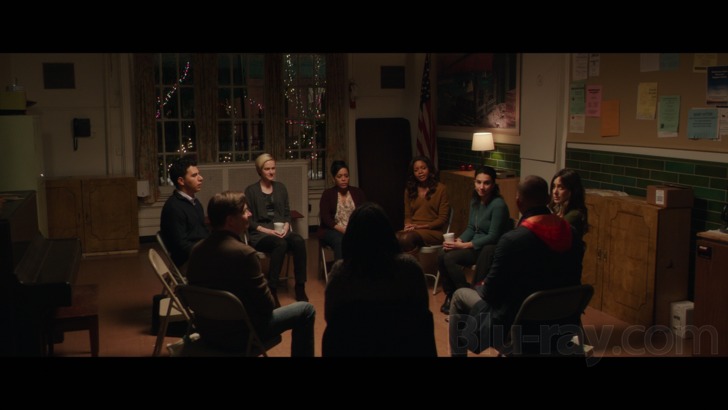
Maryse Alberti (Creed, The Visit) supplied the Alexa-captured cinematography of
Collateral
Beauty, and the look is a departure for the French-born cinematographer, whose trademark is
documentary realism. Consistent with the effort to create a modern fable, Alberti's lighting gives
New York's Christmas decor a warm and shiny surface, and the production design favors clean
lines and rich textures. Collateral Beauty takes place in a world where people talk about money
problems, but no one looks like they're struggling. Even Kate Winslet's trip to what is supposed
to be a rough neighborhood late in the film is lit like a glossy ad campaign. And the New York
subways have rarely looked so spiffy and clean.
Warner's 1080p, AVC-encoded Blu-ray features the Alexa's trademark combination of sharp
detail and film-like smoothness, and the colors have been tweaked in post-production to provide a
richly varied palette that is never cold, no matter how much snow is on the ground. Blacks are
solid, hues are richly saturated, and there isn't a hint of interference or artifacting to be found. In a
notable departure from it usual practices, Warner's theatrical group has allowed the image to
spread out into the BD-50's available space, achieving an average bitrate of 34.99 Mbps, which is
territory usually reserved for the Warner Archive Collection. Digitally acquired (or post-processed) material may compress more readily than analog
sources, but the exceptional clarity and
detail of Collateral Beauty's Blu-ray presentation is yet one more example of the benefits to be
obtained from letting the compressionist "open up the throttle".
Collateral Beauty Blu-ray Movie, Audio Quality 
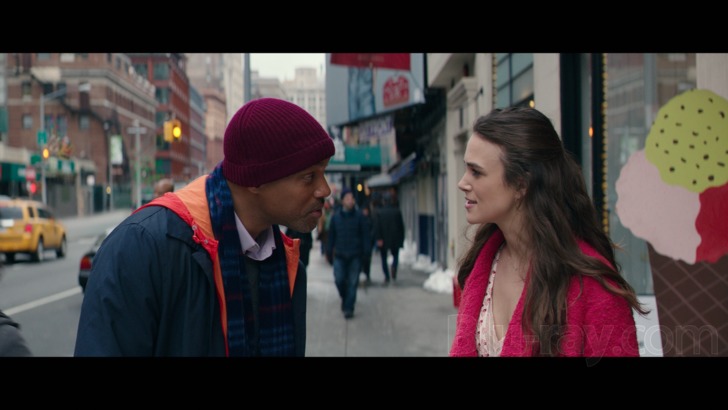
Collateral Beauty's 5.1 track, encoded in lossless DTS-HD MA, complements its faux fairy tale atmosphere with a low-key sound mix that dials down Manhattan's typical ambient cacophony in favor of subtly distinct environments. A subway ride is more acoustically agreeable than it ever is in real life, and waiting at the station is positively serene. Effects are occasionally routed to the surrounds, but the main focus remains forward, where the dialogue is intelligibly reproduced and properly localized. The score by Theodore Shapiro (We're the Millers, The Intern) labors mightily to lighten the tone of a story that features multiple deaths, inconsolable grief and a measure of deceit and deception that's extreme even by the standards of the advertising business.
Collateral Beauty Blu-ray Movie, Special Features and Extras 
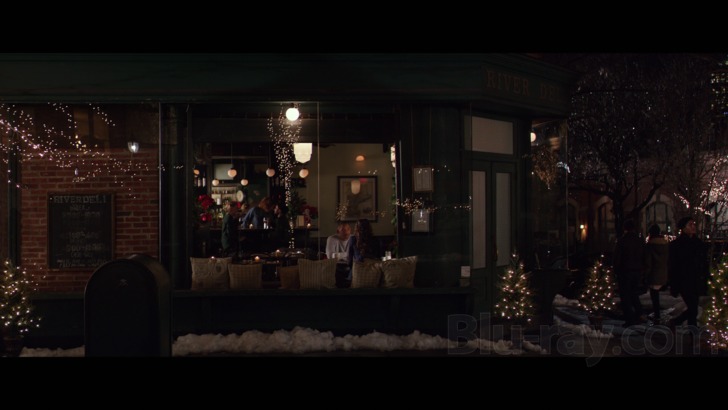
- A Modern Fable: Discovering Collateral Beauty (1080p; 1.78:1;15:03): Most of the principal cast are interviewed (with notably scant inclusion of Michael Peña), along with director Frankel, screenwriter (and producer) Loeb and producer Anthony Bregman. My wife, who doesn't usually watch extras, summed up this featurette perfectly, when she turned to me and asked: "Are they talking about the same movie we just saw?"
- Introductory Trailers: At startup the disc plays a trailer for Wonder Woman, plus the now-familiar Warner promo for 4K discs (although Collateral Beauty's was canceled).
Collateral Beauty Blu-ray Movie, Overall Score and Recommendation 
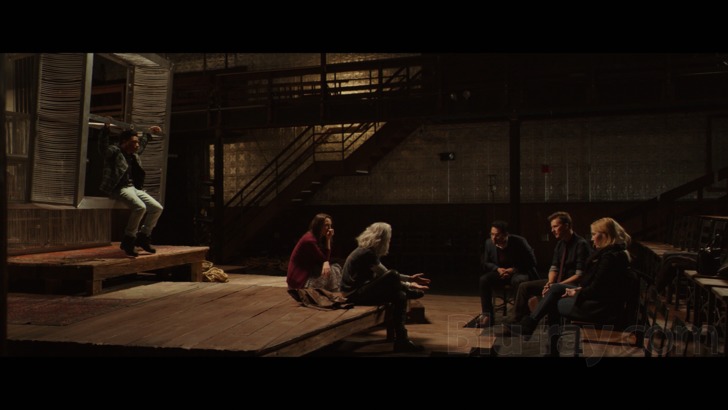
The real mystery of Collateral Beauty isn't why it's so bad; it's how such a flawed project
managed to attract such stellar acting talent. Listening to the cast talk about the film, you could be
pardoned for wondering if the script was drastically altered during production (or editing).
Collateral Beauty earned enough in foreign markets to prevent any financial damage, but it's an
embarrassment for all concerned. Not recommended, despite the Blu-ray's technical merits.
Other editions
Collateral Beauty: Other Editions
Similar titles
Similar titles you might also like

Reign Over Me
2007

The Other Woman
Love and Other Impossible Pursuits
2009

Extremely Loud and Incredibly Close
2011

Charlie St. Cloud
Charlie St Cloud
2010

Cake
2014

Brooklyn
2015

Seven Pounds
2008

The Shack
2017

Me Before You
2016

The Light Between Oceans
2016

Racing Hearts
Flying Home
2014

The Vow
2012

Love Happens
2009

The Longest Ride
2015

Autumn in New York
2000

The Best of Me
Tears of Joy Edition
2014

Noel
2004

Nights in Rodanthe
2008

Midnight Sun
2018

Boulevard
2014

